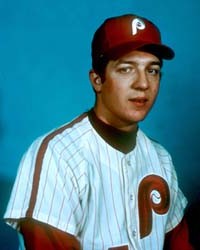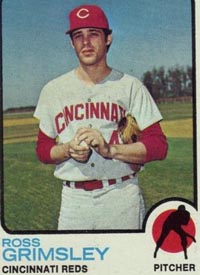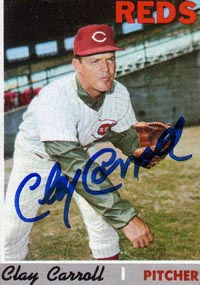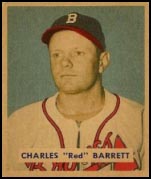For most of the 1930s, Vernon "Lefty" Gomez served as the AL's counterpart to "Dizzy" Dean of the Cardinals and Cubs.
- Born in northern California in 2008, Gomez pitched in the Pacific Coast League for three seasons before joining the Yankees for part of the 1930 campaign. New York paid the San Francisco Seals $45,000 for him, an incredible sum in that era.
- By 1931, Lefty occupied a spot in the Yankees rotation. Through the 1938 season, he won 151 games or an average of almost 19 per year.
- Gomez started the first All-Star in 1933 and five of the first six. He started seven World Series games, winning six and losing none. He has the most wins of any hurler who is undefeated in the Fall Classic.
- He retired in 1943 with 189 victories.
Like Dizzy, "Goofy" Gomez is as well known for his flakiness and sense of humor as his pitching. It has been written of him that, in addition to his victories, ERA, and other pitching stats, he led the league in "most laughs per nine inning game."
- Lefty on Jimmie Foxx, the muscular 1B of the A's and Red Sox: "Foxx wasn't scouted. He was trapped."
- One day, Foxx came to bat with the bases loaded. C Bill Dickey signaled for Lefty's top pitch, a fastball. Gomez shook him off. So Dickey called for a curveball. Another shake off. So Bill went to the mound. "What do you want to throw this guy?" "Nothing," Lefty replied. "Let's wait a while. Maybe he'll get a phone call."
- After the first moon landing, Gomez told an audience: "When Neil Armstrong first set foot on the moon, he and all the space scientists involved in the Apollo Project were puzzled by an unidentifiable white object. I knew immediately what it was. That was a HR ball hit off me by Jimmie Foxx in 1937."
- Recalling his physique as a 6'2" 150 lb. rookie, Gomez said, "I was so skinny that until I was 23, I never cast a shadow."
- In 1939, Joe DiMaggio made possibly the finest catch ever in Yankee Stadium, presaging Willie Mays' 1954 World Series play by grabbing a towering Hank Greenberg clout with his back to the IF just in front of the flagpole in dead CF 450' from the plate. Afterwards, a writer praised Joe for playing a shallow CF like Tris Speaker to catch low liners while still having the speed to go back for long balls. In a subsequent game, Rudy York hit two drives off Gomez that went over DiMag's head for triples. After the second, Lefty asked his roommate why he played York so shallow. "Didn't you see the paper?" Joe asked with mock seriousness. "I'm going to make the fans forget Tris Speaker." "Okay," Lefty retorted. "Just be sure you don't make 'em forget Gomez."
- Another witticism involved the A's great slugger, Al Simmons. After Al swung and missed two pitches, umpire Bill McGowan walked to the mound and told Lefty: "Simmons says you're throwing spitballs." The southpaw answered, "Tell him to hit it on the dry side."
- The 1937 Yanks were breezing to their second straight pennant when they fell into a slump. They had lost several games in a row when Lefty took his turn as the starter. A writer had called one of the five future HOFers on the team, 2B Tony Lazzeri, the smartest player in baseball. So with a man on 1B, the batter hit a one-bouncer to Gomez, who turned and, ignoring SS Frankie Crosetti nearing the bag, tossed the ball to the bewildered Lazzeri halfway between first and second. When the latter came to the mound to ask why, Gomez replied: "I been reading about how you're the smartest ballplayer on this club, and I wanted to see what you'd do with that one." When the inning ended, manager Joe McCarthy posed the same question, to which Lefty replied, "There are too many Italians on this team. I saw Crosetti and Lazzeri and got confused." McCarthy trumped his P with "It's lucky you didn't see DiMaggio."
- When voted into the Hall of Fame by the Veterans Committee in 1972, Goofy commented: "It's only fair. After all, I helped a lot of hitters get in."
- In the 1970s, a sportswriter asked Lefty if his 6-0 World Series record would hold up. "Well, I don't think I'm gonna lose any."
- When Mark Fidrych caused a sensation in the mid-70s with his great pitching as well as his antics, such as talking to the ball, a writer asked Gomez if he had ever talked to the ball. "Lots of times," replied the old-timer. "What did you say to it?" "Go foul, you bastard, go foul!"
Reference: "Lefty Gomez Enlivened the Game with Comedy," Jerry D. Lewis,
Baseball Digest, December 1977
Top of Page |
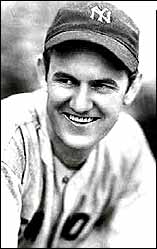
Lefty Gomez
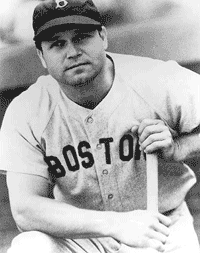
Jimmie Foxx
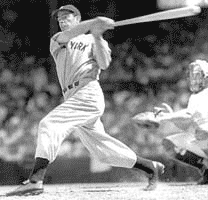
Joe DiMaggio
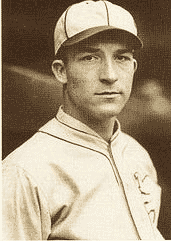
Al Simmons
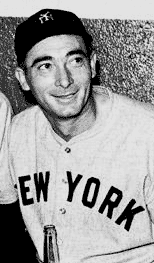
Tony Lazzeri
|
He Shoulda Got the Flu before Every Start
|
|
Rick Wise didn't feel well as he warmed up for his start against the Cincinnati Reds on June 23, 1971 at Riverfront Stadium.
- Rick was just getting over the flu. "I felt weak when I was warming up, not much pop on the ball, and I knew I was going to have to locate my pitches."
- He must have located the ball well because he retired the first 16 Reds before walking SS Dave Concepcion. "My control was very good. I was around the plate all night. I was spotting the ball where I wanted."
Wise, regarded as one of the best hitting P in his day, aided his own cause with his bat.
- Stepping to the plate with a man on in the top of the fifth, Rick walloped a "high, spinning slider" from southpaw Ross Grimsley over the LF fence.
- In the eighth, facing Clay Carroll with a 2-0 count, Wise looked to 3B coach George Myatt for the sign. "When he sees me, he turns his back on me – so I knew I had the green light. I knew a fastball was coming and I got it on the right spot, hitting it over the LCF fence."
Meanwhile, on the mound, the Phillie RHP was mowing down the home team.
- After Concepcion's BB, Wise retired the next 12 batters to complete a 4-0 no-hitter.
- Rick: "Pitching a no-hitter is a great memory, and to hit two HRs in the game made it unique."
Adding to the unique accomplishment was the fact that Wise had another two-HR game that season.
- On August 28, facing the San Francisco Giants at Veterans Stadium, he hit a solo four-bagger off John Cumberland in the sixth to give the Phils a 3-2 lead.
- After the visitors tied the game again, Wise whacked a grand slam in the seventh off Don McMahon for a 7-3 victory.
1971, Rick's best in his ML career (17-14, 2.88 ERA) included another special mound performance.
- Saturday, September 18 saw the Cubs in Philly. Wise gave up three runs in the first two innings.
- Then he settled down and retired 32 consecutive batters. Only Harvey Haddix has retired more in a single game. Wise's streak finally ended with a two-out single by 3B Ron Santo in the 12th.
- In the bottom of the inning, illustrating a major difference in baseball strategy then and now, manager Frank Lucchesi let Rick hit for himself with the bases loaded and one out. He responded with a single to RF to plate the winning run.
So four great games by Wise in 1971, any one of which would have made it a memorable season.
Reference: "Pitchers Recall Two-HR Games" Bob Kuenster, Baseball Digest, May/June 2010 |
If ever a player deserved his nickname, it was Jack "Lucky" Lohrke.
- In 1943, a troop train with Lohrke on board crashed. Three died, and dozens were seriously burned. However, Jack walked away unscathed.
- He fought in the Normandy invasion and the Battle of the Bulge in World War II. In four separate incidents on the same day, a soldier next to him was killed, but Jack returned home without a scratch.
- In 1945, Lohrke was leaving the service when he prepared to board a military transport in New Jersey for the trip home to California. Shortly before takeoff, a higher-ranking officer bumped him from the flight. Jack was angry and disappointed. For one thing, he said, I'd never been on a plane before. It was a good thing he wasn't on this one because the plane crashed, killing all the passengers.
- In 1946, Lohrke and his minor league teammates on the class B Spokane Indians of the Western International League boarded a bus for a ride from the eastern edge of the state of Washington for a series at Bremerton on the peninsula west of Seattle. During a lunch stop at Ellensburg, just before the bus would ascend through the Cascade Mountains, Jack received word from a state trooper that he'd been promoted to Triple-A San Diego. Given a choice of continuing with the team to the next train station or returning to Spokane to take a flight to San Diego, he took his gear and hitchhiked back east. An hour later while driving on a rain-slicked pass, the bus swerved to avoid a car that crossed the center line and slid 500' into a wooded valley, killing nine players and injuring six others. It remains the most deadly crash involving an American pro baseball team.
- By the time the 23-year-old Lohrke made the Giants as a utility man in 1947, these tales had preceded him. So even before the team broke training camp in Phoenix, articles referred to him as "Lucky."
During his seven-year ML career, Lohrke hit a record-breaking HR and almost got into one of the most famous games of all time.
- In his rookie year, 1947, Lohrke smacked the Giants' 183rd HR of the season, breaking the team record set by the 1936 Yankees. The Giants finished with 221, 11 of them contributed by Lucky. That turned out to be half of his final ML total.
- He did not get into the Giants' three-game playoff against Brooklyn for the 1951 pennant. Right before Bobby Thomson's "Shot Heard 'Round the World" in the bottom of the ninth, Giants RF Don Mueller broke his ankle sliding into 3B. Manager Leo Durocher sent Lohrke to the bullpen in deep right-center field to warm up and take over for Mueller if the game went to extra innings.
- After that season, Lohrke was traded to the Phillies. He played two seasons for them before finishing his career with several more seasons in the Pacific Coast League. His final average in the majors was .242.
- After retiring, he worked in security for the Lockheed Missile and Space Company in California.
The seemingly indestructible Lohrke finally died on April 29, 2009, at age 85. His son reported that Lucky "didn't really like that nickname. It reminded him of too many things."
Reference: Baseball's Most Wanted, Floyd Conner |
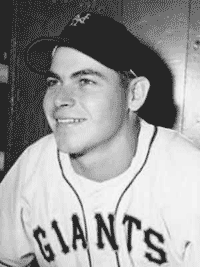
Jack "Lucky" Lohrke
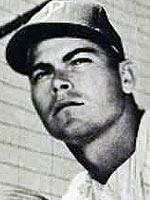
Lohrke with the Phillies
|
Don't
Let Ty Get That Title!
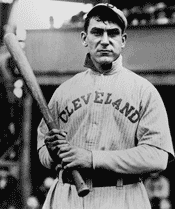
Nap Lajoie
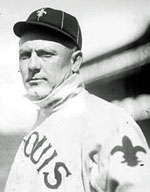
Jack O'Connor
|
One of the most shameful incidents in baseball history occurred on the last
day of the 1910 season when the St. Louis
Browns conspired to give the American League batting title
to Nap Lajoie rather than to Ty Cobb.
Before
the season, Hugh Chalmers created the Chalmers
Award, which promised a new automobile to the batting champion
of each league. Going into the last day of the season, Cobb,
the most hated player in the league, had a seven point leader over Lajoie,
one of the most popular players. With a big lead, Cobb
sat up the last day's game for the Detroit
Tigers. Lajoie's Cleveland
Indians played a doubleheader at St.
Louis. Nat would need a hit in nearly
every at-bat to catch Cobb.
Browns
manager Jack O'Connor ordered rookie 3B Red Corriden
to play deep when Lajoie batted. Nat
tripled his first time up. Then in each of his remaining eight at-bats
in the two games, Lajoie bunted toward third. One bunt
led to a fielder's choice but the other seven resulted in hits. (After
the fielder's choice, Browns
coach Harry Howell sent a note to the official scorer
offering to buy him a new suit if he would change his ruling.)
When
the final averages were tabulated, it was determined that Cobb
had been deprived of two hits during the season because of a scoring error.
So Lajoie finished one point behind Cobb,
.385 to .384. Chalmers decided to award autos to both
players. For the next four years, the Chalmers Award
went to the Most Valuable Player in each league as voted by the writers.
O'Connor
and Howell both lost their jobs, and AL President Ban
Johnson promised that neither man would ever find another job
in Organized Baseball.
In a final twist to the story, researchers in 1981 discovered that two of
Cobb's hits had been double counted. So Lajoie
actually finished one point ahead of Cobb, .374 to .373.
Nevertheless, Ty is still recognized as the "official"
AL batting champion for 1910.
|
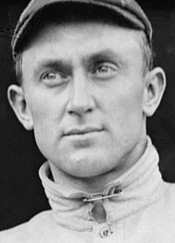
Ty Cobb
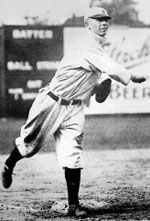
Red Corriden
|
Reference: Rob Neyer's Big Book of Baseball Blunders, Rob Neyer
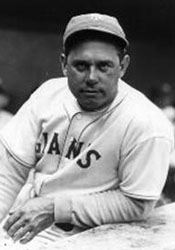
Bill Terry
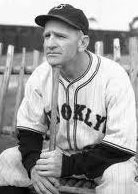
Casey Stengel
|
Before the 1934 season, Bill
Terry, manager of the defending World Champion New
York Giants as well as their first baseman, was asked
how the season would go. "Pittsburgh,
St. Louis, and Chicago will be the teams we'll have to beat." "Do you fear the Dodgers?"
a reporter asked. "I was just wondering," Terry
said, "whether they were still in the league." When informed
of the remark, Dodgers
business manager Bob Quinn replied, "... the Brooklyn
club may fool Mr. Terry by being the team to prevent
him from repeating his triumph of last year. At least, we'll let him know
we are still in the league."
As luck would have it, the Giants
played Casey Stengel's Dodgers at
the Polo Grounds the last two games of the season. They held a 14-6 edge over
the Bums that year. Terry's club had just lost three in a row to surrender first place by a game to
the hard-charging St. Louis Cardinals, the famous Gashouse Gang of Dizzy
Dean and Pepper
Martin. Needing victories over the sixth-place Dodgers
and at least one Card loss
to Cincinnati to tie for
the pennant, the Giants
instead blew both games, 5-1 and 8-5. Meanwhile, Dizzy
defeated the Reds 9-0 for
his 30th win to clinch the title with one game left. (Dean
remains the last NL hurler to win 30 games in a season. Only Detroit's
Denny
McLain in 1968 has won 30 games in the AL since 1934.)
The
Giants, who led by 7 games
as late as September 6, finished the season by losing six of their last
seven. Meanwhile, St. Louis
won 14 of 17, starting with three victories in a four-game series at the
Polo Grounds September 13-16. The Cardinals went on to defeat Detroit in seven games in the World Series.
Terry was not popular with the press, umpires, opposing teams, or even many of his own players. Some New York writers claimed Bill's
"arrogance" cost his team the 1934 pennant. Terry
averaged .341 over his career and was (and still is) the last National
Leaguer to hit .400 for a season (.401 in 1930). Yet the writers didn't
vote him into the Hall of Fame until 1954, 18 years after he retired as
a player. He expressed no bitterness about his election delay and annually
participated in the Cooperstown ceremonies.
|
On August 10, 1944, right-hander "Red"
Barrett of the Boston Braves used only 58 pitches to set down his former team, Cincinnati. Barrett pitched a two-hit shutout in front of 7,783 at
Crosley
Field. Barrett recorded neither a walk nor a strikeout.
Furthermore, he never fell behind in the count to any batter. His performance
is, as far as research can tell, the fewest number of pitches in a
nine-inning game in major league history. The contest also ranks
as the shortest night game ever, having taken only one hour and fifteen
minutes. Barrett was not a Hall of Fame pitcher. In fact,
his lifetime record is exactly .500 at 69-69. After his stint with the
Braves, he pitched for the
Cardinals.
Thanks to S.
Derby Gisclair of SABR New Orleans |
|
Almost
Another Red Double No-Hitter
Johnny
Vander Meer is famous as the only pitcher in major league
history to throw back-to-back no-hitters (1938). Less well known is that
another Cincinnati pitcher, Ewell
Blackwell, came within two outs of duplicating Vander
Meer's feat.
- On
June 18, 1947, the 6' 6" 190 lb. Blackwell, called
"The Whip" for his wicked sidearm delivery, no-hit the Boston
Braves 6-0 before 18,137 at Crosley Field.
- Then,
on June 22 in the first game of a Sunday doubleheader attended by 31,204
home fans, Ewell kept the Brooklyn
Dodgers, who would win the pennant that year, hitless
for eight innings.
- Let Ewell tell his recollections of the game.
By the top of the ninth we were leading, 4-0, and I still had the no-hitter going. You know, looking back, it was interesting how many coincidences were at work. the only man in major-league history ever to pitch consecutive no-hitters also pitched for Cincinnati - Johnny Vander Meer. He'd pitched them in the same month that I was going after mine - June. And not only that, but he had pitched them against the same clubs and in the same order as I was hoping to do - the Braves and the Dodgers. And to cap it all off, Johnny Vander Meer was still with Cincinnati and was sitting on the top step of the dugout, waiting to come out and shake my hand.
- The first batter in the bottom of the ninth, pinch hitter Gene Hermanski, flew out to LF.
- Next up was pesky 2B Eddie
Stanky. Blackwell again:
He took a pitch for a ball. Then on the next pitch he hit it back to me. I thought he had hit it harder than he actually had; when it's hit straight back at you it's sometimes hard to judge just how fast it's moving. But it wasn't hit as hard as I thought - in fact he'd broken his bat on it - and I made my move too quickly. I went down for it and came up thinking I had the ball. Well, I didn't have it. It went under my glove and right through my legs, rolled through the infield and died on the center-field grass, about twenty feet out.
I just stood there looking at that ball, that little white ball lying on the grass. How did I feel? Well, I figured about $100,000 had gone down the drain, and I felt accordingly.
- Jackie Robinson got another single
before Blackwell wrapped up the 4-0 victory.
- These two
games were part of The Whip's 16-game winning streak,
all complete games with five shutouts. He led the National League with
22 wins that season.
Reference: Baseball between the Lines: Baseball in the Forties and Fifties
as Told by the Men Who Played It, Donald Honig (1976)
|
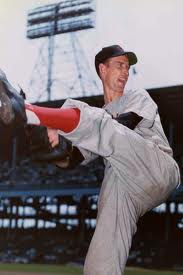
Ewell Blackwell
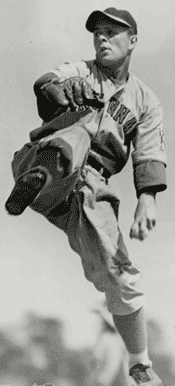
Johnny Vander Meer
|
|
|
Anything to Stop a Double Play
Don Hoak of the Cincinnati Reds took advantage of a loophole in the rules to prevent a double play. Playing against the Milwaukee Braves
in 1957, Hoak was on second with Gus Bell
on first. Wally Post hit a grounder toward shortstop
Johnny Logan. Don surprised everyone
by fielding the ball with his bare hands before it could reach Logan.
He was called out for interfering with a batted ball but prevented a certain
double play since Post was not a speedy runner. His action
caused the rules committee to modify the rule to allow an umpire to call
the batter out also in that situation if the runner intentionally gets
hit by the batted ball.
Hoak is best known as the third baseman on the Pittsburgh
Pirates' 1960 World Championship team.
Reference: Baseball Digest, June 2007 |
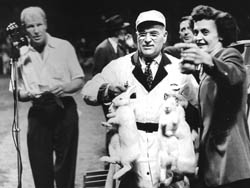
Bill Veeck announces prizes for randomly selected fans.
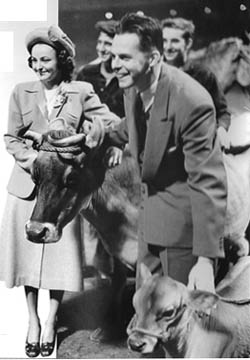
Mr. and Mrs. Joe Earley with some of their "gifts"
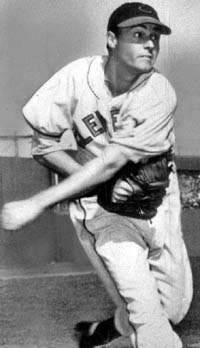
Gene Bearden
|
The 1948 American League pennant race was one of the greatest in history.
- Attendance soared during this era between World War II and the
spread of television to almost every home in the 1950s.
- The Cleveland
Indians set a record with 2,620,627 fans. This was due to great
baseball plus the marketing genius of their flamboyant owner Bill
Veeck.
One of Veeck's ideas was inspired by a letter in the Cleveland
Press. The letter writer, inspired by Ken Keltner Night
in honor of the Tribe's third sacker, had a novel idea.
Now they want to have a "Bill Veeck Night." It's a good idea,
but here's another suggestion. Let's have a "Joe Earley Night."
I pay my rent and my landlord spends it on things that keep business stimulated.
I keep the gas station attendant in business by buying gas regularly.
I keep the milkman in clover by buying milk. He uses trucks and tires
and as a result big industry is kept going. The paper boy delivers the
paper, wears out a pair of shoes occasionally and the shoemaker wins.
My wife keeps a grocer and a butcher ... in business and the department
stores as well.
A lot of people depend on me (and you) so let us all get together, and
send in your contributions for that new car for "Good Old Joe Earley Night."
Joe Earley, 1380 Westlake Avenue
Earley wrote the letter tongue-in-cheek, but many people liked the idea, calling Joe and sending letters and even donations, which Mrs.
Earley announced would go to the Cancer Fund in honor of Joe's boyhood hero, Babe Ruth, who had died a month earlier from throat cancer.
Veeck designated September 28, 1948
as "Good Old Joe Early Night" to honor the average fan. 60,405
fans turned out on a Tuesday night.
- Veeck distributed orchids, flown in from Hawaii in an air-conditioned plane, to the first 20,000 women to enter Municipal Stadium.
- In a ceremony before the game, Bill called lucky fans down to home plate to receive gifts, including four white rabbits and a decrepit horse.
Finally, he introduced Joe Earley himself.
- Veeck presented the war veteran with a house built in the style of early American architecture. Only it was an outhouse, driven
in from left field on a truck.
- Then Joe received a car
– a model T filled with comely lasses.
- But then came the real prizes:
a new convertible and a truck packed with household appliances donated
by local merchants.
- Joe also received a lifetime pass
to any American League park.
The
game that followed against the last place Chicago
was anything but anti-climactic because the Indians
held a two-game lead over Boston
and New York with five games
to play.
- The White Sox had
beaten Cleveland in five of their last six meetings.
However, the gala night belonged to the Indians.
- Gene
Bearden, the knuckleballing rookie left-hander who had become
Cleveland's top pitcher, threw with two days rest. Tribe
batters made his job easy by pounding the Sox
pitchers for Gene's 18th victory, 11-0.
Cleveland blew the two-game lead to finish in a tie with the Red
Sox. However, they won at Fenway in a one-game playoff before dispatching the other Boston team, the Braves, in a six-game World Series.
|
Another Giants-Dodgers Playoff
The San Francisco Giants met their West Coast rival, the Los Angeles Dodgers, in the third and final game of their postseason playoff for the NL championship. The game had many similarities to the clubs' last playoff meeting eleven years earlier on the other side of the continent.
- The teams were tied 1-1, necessitating the third and final playoff game.
- The third game was played on October 3, the same date as the famous Bobby Thomson HR game in 1951.
- The Giant SS in '51, Alvin Dark, was now their manager.
- The Giant manager in '51, Leo Durocher, coached under Walter Alston for the Dodgers, a franchise Leo had managed from 1939-48.
- Willie Mays still patrolled CF for the Giants, and Johnny Podres still pitched for the Dodgers.
- This time, the deciding game would be played on the Dodgers' field in Chavez Ravine.
The eeriest similarity, however, came about in the way the game ended.
- LA held a 4-2 lead going into the top of the ninth. That was the same score the Dodgers had led by going into the bottom of the ninth at the Polo Grounds in 1951.
- Alston was heavily criticized after the game for staying with reliever Ed Roebuck, who had pitched three scoreless innings, rather than starting the inning with his bullpen ace, Ron Perranoski, who had 20 saves.
- Alston let Roebuck bat in the bottom of the eighth with the bases loaded and two outs. Ed grounded out to end a promising inning.
There would be no dramatic HR, but the Giants would capture the pennant with another 9th-inning rally.
- PH Matty Alox coaxed a walk from Roebuck.
- LF Harvey Kuehn hit into a forceout at second.
- Willie McCovey, who didn't start because of an injury, came to the plate as a pinch hitter for 2B Chuck Hiller. It would seem to have been an ideal spot for Alston to go to the lefty Perranoski, but he didn't. Roebuck walked McCovey to put the tying run on first. Ernie Bowman ran for Stretch.
- RF Felipe Alou also walked to load the bases. Still no pitching change.
- Mays beat out an IF hit that scored Kuehn from third.
Alston finally replaced Roebuck but with RHP Stan Williams, not Perranoski.
- 1B Orlando Cepeda plated the tying run with a SF. Alou scooted to third on the play.
- After a wild pitch sent Mays to second, the Dodgers intentionally walked C Ed Bailey to reload the bases.
- Williams walked 3B Jim Davenport unintentionally to give the Giants a 5-4 lead.
At last, Alston called on Perranoski.
- SS Jose Pagan reached on an error by 2B Larry Burright with Mays scoring an insurance run.
- Perranoski finally retired the side, but it was too late.
- The Dodgers went down meekly against LHP Billy Pierce in the bottom of the ninth.
- Don Larsen, perfect game hurler of the '56 World Series, was the winning pitcher after tossing a scoreless eighth.
The Giants moved on the World Series where, again following the '51 script, they met the New York Yankees. They lost to the Yanks again, this time in seven games rather than six.
|
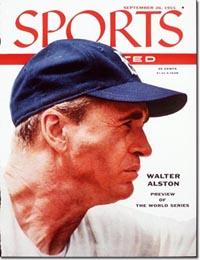
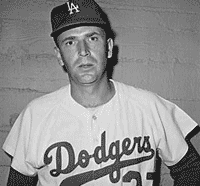
Ed Roebuck
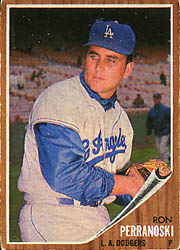
Top of Page |
|
|
CONTENTS
The AL's Dizzy Dean
He Shoulda Got the Flu before Every Start
"Lucky" Lohrke
Don't Let Ty Get That Title!
Be Careful What You Say
Quick Work
Almost Another Red Double No-Hitter
Anything to Stop a Double Play
Joe Earley Night
Another Giants-Dodgers Playoff
Baseball
Vignettes Index
Baseball
Page
Golden Rankings Home
|
